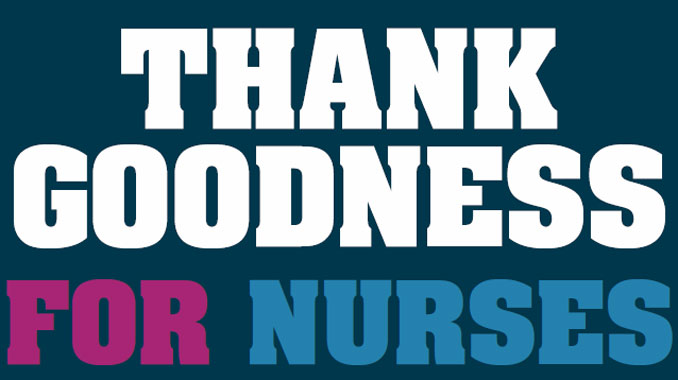
The World Health Organization declared 2020 to be the “Year of the Nurse and Midwife” in celebration of the 200th birthday of Florence Nightingale (1820–1910). Across the globe many organizations, professional associations, health care systems, and other entities were set to celebrate the many roles and contributions of nurses in advancing the health and welfare of people in every nation.
It was completely unexpected that this would also be the year of an international health crisis—a global pandemic that has now touched every level of society. Today the entire world is coping with the impact of COVID-19. Nurses are on the frontline in this environment.
From providing direct care to affected hospitalized patients to leading full scale public health operations, nurses are front and center working around the clock to protect the health and well-being of patients, employees, and the public at large. We are very proud of nurses everywhere as they provide services during the current pandemic.
As a show of our own appreciation, we chose to highlight some of our local nursing heroes and we truly cannot thank them enough for all that they do to keep our communities safe during these extremely challenging times.
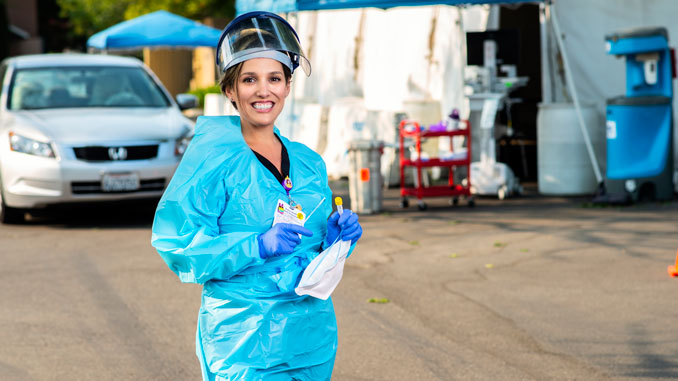
Desiree Sanders, RN, BSN | Sutter Gould Medical Foundation Urgent Care Stockton
Over the years Desiree Sanders has seen an overwhelming amount of colds, flus, and other minor injuries working in urgent care. Then 2020 came, and as COVID-19 began to spread, the nearby Stockton Ambulatory Surgery Center temporarily closed, but allowed urgent care staff to use the lobby and vestibule to serve patients in a drive-through clinic for COVID-19 screening and testing.
“One morning, I pulled into the parking lot and there were approximately 100 cars lined up,” Desiree recalls. “It was a lot to take in, but I knew my patients–and just as importantly—my team, needed me. I put on all the appropriate personal protective equipment and got to work.” Since COVID-19, there have been plenty of challenging days, but there have been good ones, too. “Patients are so appreciative of the work we are doing. We have had local businesses send us lunch and give us treat bags. Our managers and supervisors have done the same. We have finally gotten into a rhythm where we can handle what comes our way and hopefully help those here in San Joaquin County.”
Desiree enjoys being a nurse in large part because she likes being the person others come to when they are scared and sick. “Helping them, educating them, and reassuring them makes my job worth it every day,” she says.
Desiree graduated with a bachelor of science in nursing from Sacramento State in 2018.
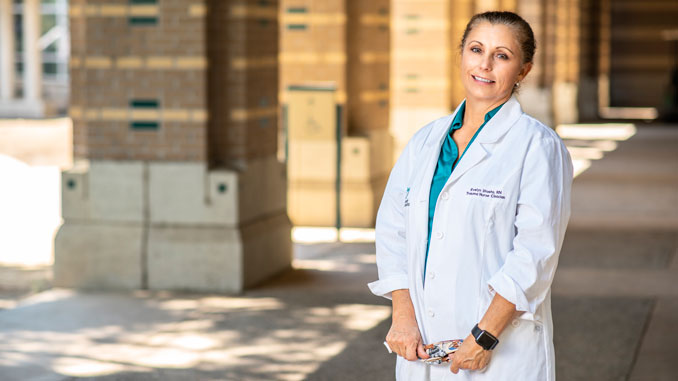
Evelyn Staehr, RN, BSN | San Joaquin General Hospital
Since the start of the pandemic, roles at San Joaquin General Hospital have expanded and changed significantly, and Evelyn Staehr’s nursing role in the trauma department is no different. In every single area of the hospital, nurses are working extremely hard. “In addition to extra patient loads they must constantly worry about their own personal safety as well as the safety of their coworkers,” Evelyn says. “The stress is incredibly high, but I feel this is when they truly shine and show the wonders of their strong, dedicated spirt. I have never been so proud of all my colleagues as I am now.”
At SJGH, staff education is a priority, however, “with the current creative and supportive leadership in place, we have overcome many barriers to continued education caused by the pandemic,” Evelyn says. Even hundreds of year ago, Florence Nightingale wrote about cleaning, distancing, and open-air ventilation as forms of disease prevention and care. She was extremely dedicated to the patient as well as her coworkers. Evelyn says, “I can personally see that same care from our nurses today. Her teaching is as true today as yesterday and how wonderful to follow such a great mentor.”
Evelyn Staehr also serves as the assistant department manager for trauma as well as the trauma department educator. She is board certified in trauma care and has an 18-year background in emergency nursing care.
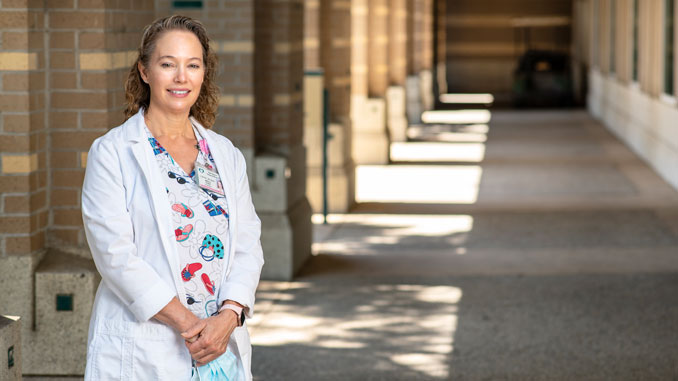
Julie Rose RN, IBCLC | San Joaquin General Hospital
As a registered nurse with over 30 years of experience in the neonatal intensive care unit (NICU), Julie Rose has experienced her fair share of changes over the years, but nothing compares to this global pandemic. The COVID-19 crisis has had a profound impact in the hospital setting, making it a daily juggle of bed availability, supply of PPE, and staffing. “In the NICU we have always been especially aggressive in our cleaning routine and our screening of visitors, so just a few changes were needed. We have had to limit visitors to just Mom and Dad, one at a time at the bedside. Parents are screened with a temperature check and health questionnaire, scrub their hands, and wear a cover gown,” Julie says.
2020 has brought about a lot of new, but many of the practices used to slow disease spread in the middle of the worst pandemic of the century have been around for decades, if not centuries. “The advance practice nurses that we have in our Family Maternal Center provide a critical role to provide family centered care along with a holistic approach as we bring a new life into this world. Even in this crazy COVID time that we find ourselves in,” she says.
Julie is a registered nurse with 32 years of experience specifically in the NICU setting and 28 years at San Joaquin General Hospital. She has a bachelor’s in nursing degree and completed her training as a lactation consultant to become an International Board-Certified Lactation Consultants (IBCLC). Julie is also a PICC certified nurse and teaches ‘Neonatal Resuscitation Program and Birth and Beyond’ to employees.
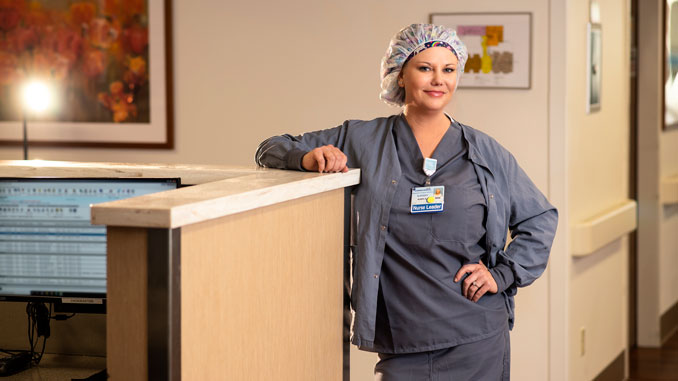
Kara Green, BSN, RN, CNOR | Dameron Hospital
Since the global pandemic has largely affected the volume of elective surgeries not only in our area, but globally, Kara’s role as operating room clinical manager at Dameron Hospital has been impacted significantly. “Surgical volumes declined during the first few months of the pandemic in preparation for a potential patient surge,” she explains. And while volumes of surgical procedures are increasing again, Kara continues to fight COVID-19 while simultaneously helping prepare Dameron for the addition of the latest robotic surgery technology.
Being a nurse amid a global pandemic is no easy feat. “I became a nurse because I am passionate for standing up for those who are vulnerable and cannot stand for themselves,” Kara says, adding she believes that being a nurse puts her in a position to serve as a patient advocate and educator, to help patients make informed decisions about their health and the health of those they love.
Kara holds a bachelor of science in nursing (BSN) degree and is a certified perioperative nurse (CNOR). She is also pursuing a master of science in nursing (MSN) degree and a registered nurse first assist (RNFA) certification. “An RNFA certification reflects my interest in not only managing the operating room and making sure it runs smoothly, but also providing direct patient care alongside the surgeon. I feel that this will allow me to have a greater positive impact on our patients’ lives,” she says.
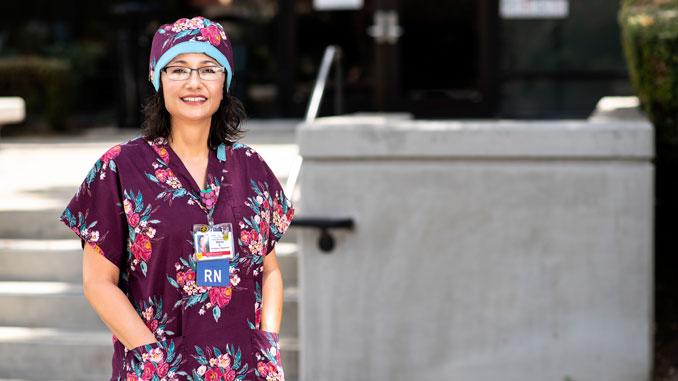
Mandy Serrano, RN | Kaiser Permanente Manteca Medical Center
Mandy Serrano is on the frontlines as a registered nurse in the emergency department at Kaiser Manteca. The ED is where her heart is, and where a patient oftentimes has their first encounter with staff. Every day as a nurse in the emergency department is different—especially now. “There are new recommendations and protocols that change almost daily,” she says. And with these frequent changes, there is constant concern and uncertainty surrounding proper protection of her patients, herself, and her family.
One of the biggest challenges Mandy has experienced firsthand is that no visitors or family is allowed in the facility. “We are the ones caring for the patients at the bedside and a lot of my time is spent trying to connect family (phone, video) with the patient,” she says. Family, for many, is a security blanket for patients, Mandy says, and she is looking forward to having them back in the facility whenever it is safe to do so.
Mandy says she is hopeful that the pandemic will bring awareness to the challenges nurses face and help them advocate to change those challenges—a potential silver lining of a horrible situation.
Mandy has worked in healthcare since high school but decided to go back to school to get her nursing degree later in life while working full-time and as a mother. She graduated from San Joaquin Delta College and started working in the emergency department where she has been for the past ten years.
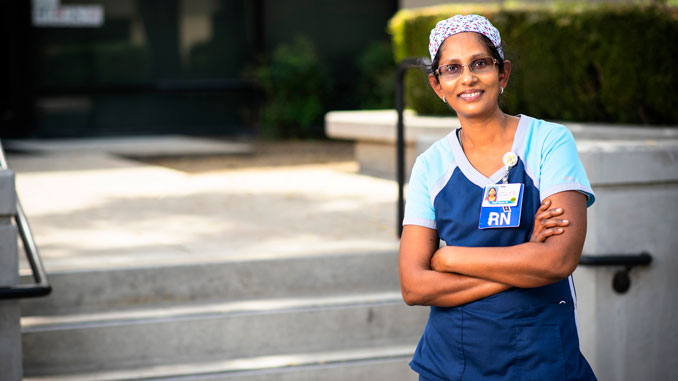
Manju James, RN, BSN, CCRN | Kaiser Permanente Manteca Medical Center
Manju James has seen many changes in her role as a nurse in the intensive care unit (ICU) at Kaiser Manteca since the start of the coronavirus pandemic. There is now a heightened value on personal health and hygiene. “We want to stay healthy ourselves to continue to help care for our patients,” she says. And the role of the nurse in the ICU has significantly changed because there are no visitors or family members allowed at the bedside.
Manju is honored that 2020 was declared the ‘Year of the Nurse and Midwife.’ She says it is perfect for the current crisis going on. The honor, however, comes with expectations from the public and her patients of what being a nurse facing the crisis of a global pandemic really means. “Kaiser Manteca has been working together as an organization to make sure that staff is set-up to provide the best care for the patients and ultimately get them home safe,” she explains. Due to increased media coverage, “people are now more aware of the day-to-day experiences and challenges that frontline and healthcare workers face every single day.”
Manju has been a nurse for about 25 years, graduating from Holy Family Nursing School in India when she was 21 years old. She worked in India for three years, Saudi Arabia for 4fouryears, and eventually made her way to California. She recently received her Adult CCRN® specialty certification in 2016, specifically developed for nurses providing direct beside care to critically ill patients.
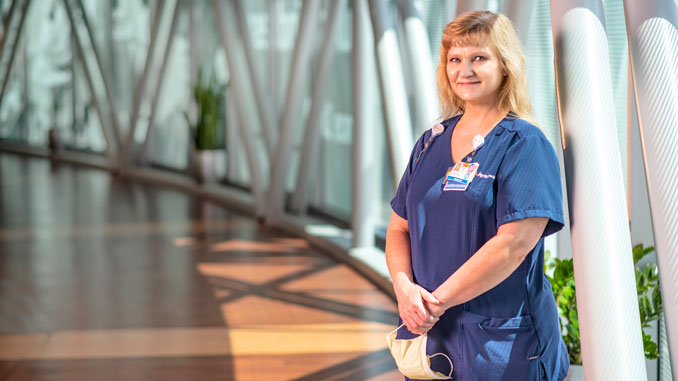
Paula Newman RN, BSN, CIC | St. Joseph’s Medical Center
Paula Newman’s role at St. Joseph’s Medical Center looks different these days due to the global pandemic and number of COVID-19 cases in the community. Paula has been a nurse at St. Joseph’s Medical Center in Stockton for 31 years, and has served as the manager of employee health, workers’ comp, infection control for the past 18 years.
Paula’s expertise is extremely essential since infection control, preventing or stopping the spread of infections in healthcare settings, is at the center of the crisis. And although Paula is busier now than ever, she hasn’t questioned her decision to become a nurse—one she steadfastly made at 5 years old, always taking care of people like her brothers and other family members when they would get sick. “This is a challenging and exhausting time to live in, but also a tremendous learning experience,” Paula says. “Everyone is looking to infection control to give guidance, especially as things are changing so often. We are constantly learning something new.”
Paula’s success, however, is a team effort, one that Paula says includes the supportive administration at St. Joseph’s Medical Center. “They are in the trenches with us, supporting us, and working tirelessly to take care of the staff and patients.”
Paula graduated from San Joaquin Delta College with as a registered nurse and bachelor of science in nursing degree and is also nationally certified in infection control (CIC).
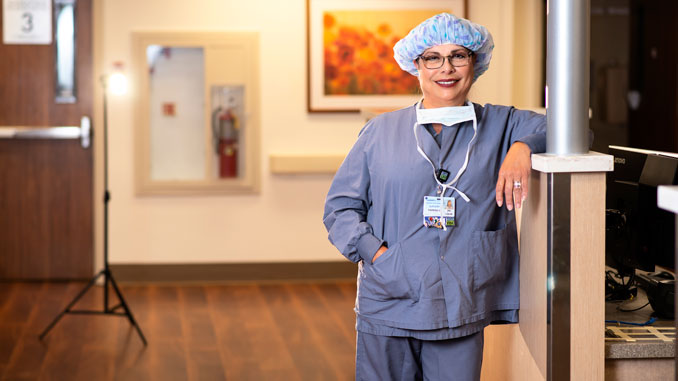
Theresa Gusman, RN, CNOR | Dameron Hospital
For Theresa “Terry” Gusman, the assistant nurse manager in surgery at Dameron Hospital in Stockton, COVID-19 has sent ripples of change throughout the department, a common theme for life-as-we-knew-it since the pandemic. With tears in her eyes she says, “I have personally seen the effects of the pandemic from all perspectives – giving care at the bedside, in a surgical procedure, having someone close to you ill with COVID-19. And how devastating and tragic it can be at every level. There is a whole new world to nursing now with COVID-19.”
Terry’s main role at Dameron is within the surgery department and she reports that many additional precautions are taken now with surgery procedures such as testing for COVID-19 and making sure proper personal protective equipment (PPE) is available. The overall goal is to keep patients and staff safe and unexposed. There are many unknowns in the future of nursing – will there be any future equipment/PPE shortages? How will new nurses get trained and into the field? When will a vaccine be safely developed?” Those are just a few of Terry’s concerns.
Terry has been a nurse since 1985, graduating locally from San Joaquin Delta College. She holds a national certification in surgery and has held certifications in emergency, TNCC, and critical care.
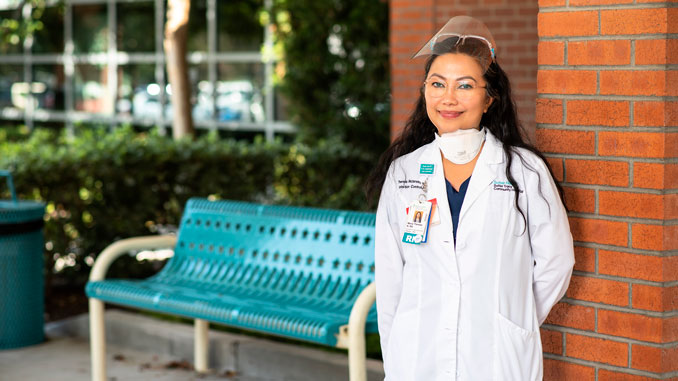
Theresa Nazareno, RN |Sutter Tracy Community Hospital
The current pandemic has changed absolutely everything for Theresa Nazareno, who has served as the infection preventionist and employee health nurse at Sutter Tracy Community Hospital since 2010. But in the middle of the pandemic, all the changes have affirmed what she already knew about working at Sutter Tracy. “We come together when the going gets tough.” Firsthand, Theresa sees how staff all respect each other, and how they can work together toward a common goal, protecting both patients and themselves. “I am grateful to be part of a healthcare system and its efforts to help provide employees what they need to care for patients and our community.” But perhaps Theresa’s best observation during this time is how people in the hospital community are treating each other. “The people here are caring for each other more than ever.” As flu season is also here, Theresa says healthy living is going to become even more important, including eating nutritious foods, exercising, getting sufficient rest, and staying hydrated. “Self-care and self-love is especially valuable during trying times,” she says. Theresa has been a nurse at STCH for the past 12 years. She holds a bachelor of science degree from a nursing school in the Philippines that she earned in 2003 before moving to the U.S. in 2004. She is also in her second year of a family nurse practitioner program and plans to graduate in early 2022.
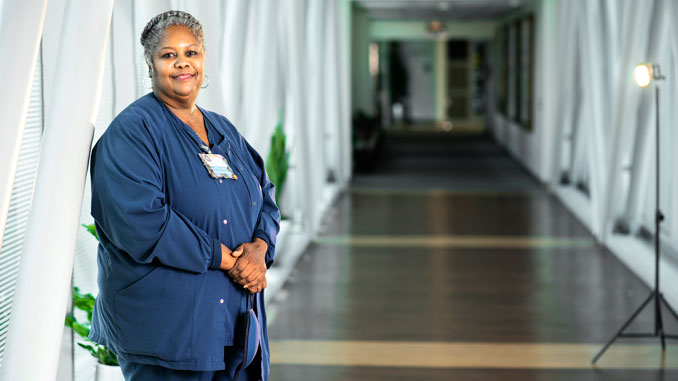
Valerie Peoples, RN-BC, BSHS, WOCN | St. Joseph’s Medical Center
Valerie Peoples has been a nurse at St. Joseph’s Medical Center in Stockton for the past 27 years, but with the onset of COVID-19, her role quickly and drastically transformed. But this isn’t the first time Valerie has seen “unprecedented times.” As life makes a full circle, this is Valerie’s first epidemic and second pandemic in her career.
One year into her nursing career, Valerie was faced with her first epidemic—AIDS. It was a new and scary time and nurses took on the challenge. “I cared for dying young men in the prime of their lives, I cried with them, prayed with them, and held their hands as they took their last breath and passed away,” she says.
Valerie is now on the frontlines as the ‘the screening coordinator’ where she is responsible for ensuring adequate staffing of the screening stations, keeping stations stocked with necessary supplies, and updating staff when new information is available. The little things help her get through. “Resources have been put in place that every nurse has access to if in need of spiritual support or encouragement. We have been provided meals, snacks, flowers, and have participated in hospital parades acknowledging how much our hospital volunteers are missed,” Valerie says.
Valerie has been an RN for 40 years and has held many supervisory roles in medical/surgical, skilled nursing, orthopaedic, and telemetry. She also holds a specialty certification as a WOC nurse.

